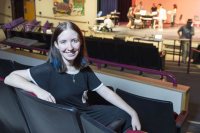
Student directors present three short plays
Three theater majors at Bates College present one-act plays in November that they are directing as independent study projects.
The double bill of Tape and The Break of Noon is performed at 7:30 p.m. Friday and Saturday, Nov. 8-9, in Gannett Theater, 305 College St. The Ages of the Moon is performed at 7:30 p.m. Tuesday through Thursday, Nov. 19-21, in the Black Box Theater, also at 305 College St.
Admission to both productions is free and open to the public. For more information, please call 207-786-6161.
Tape is being directed by Nick Auer, a junior from Fairfield, Conn. Also a junior, Jonathan Schwolsky of North Caldwell, N.J., directs The Break of Noon. In charge of The Ages of the Moon is Andrew Overby, a senior from Simsbury, Conn.
Auer chose Stephen Belber’s Tape because of its relevance to people of college age. The play follows three former high school friends, now in their late 20s, who are stuck in the past. Each character has a different memory of their high school years, a time that shaped them in profoundly different ways.
Auer was drawn to the “common schooling yet divergent futures” of the characters in Tape, noting that most students have this experience as they get older. “Ten years from now,” he says, “we’ll all have similar pasts but be in completely different places in life, and I’m interested in how that influences the interplay of regret and memory.”
Schwolsky chose Neil LaBute’s The Break of Noon in part because of one of the questions the play poses: “How would you take it if somebody you didn’t like heard the voice of God?” Grappling with issues such as workplace gun violence and the meaning of religion, “The Break of Noon” examines how modern-day miracles are perceived in a skeptical world.
One of America’s leading playwrights, Sam Shepard wrote The Ages of the Moon. It’s the story of two old friends, very different in nature, “who are compelled to mutually support each other in a time of personal crises,” says Overby, who has directed one other play at Bates.
“The two grapple together with their individual qualms as well as with the looming realization that they are obsolete entities looking down the barrel of their last year of life. But their unwillingness to do so makes for a surprisingly snappy and jovial piece.”
What’s the relevance of two aging men to college students entering the prime of life? “It’s a study of the struggle for human compassion, the fierce need to be loved,” says Overby. “That’s universal.”
No stranger to the stage, Auer has been happily surprised at how deep his focus on directing has become during his independent study. “There are so many things to know about directing that you just don’t get when you’re acting.”
He spent his summer interning at the York Theater Company in New York City, where he got involved in about public relations and managerial work. He also traveled to Budapest during last spring’s Short Term, Bates’ five-week, single-course semester, to experience Hungarian theater.
Schwolsky has been involved with theater since coming to Bates in 2011. A member of Bates’ Bonner Leader Program, which provides a variety of support to students with a special commitment to community service, he is writing a play for the Good Shepherd Food-Bank, based on interviews he’s doing with Mainers on the issue of food insecurity.
Directing is “a passion of mine,” he says.
“It’s cool that Bates lets you learn by doing, on so many different levels,” adds Auer. “They’ve shown me how to put learning into action.”
“We’re all rooting each other on,” said Schwolsky. “We really want to see the shows go well — because we like seeing good shows.”




